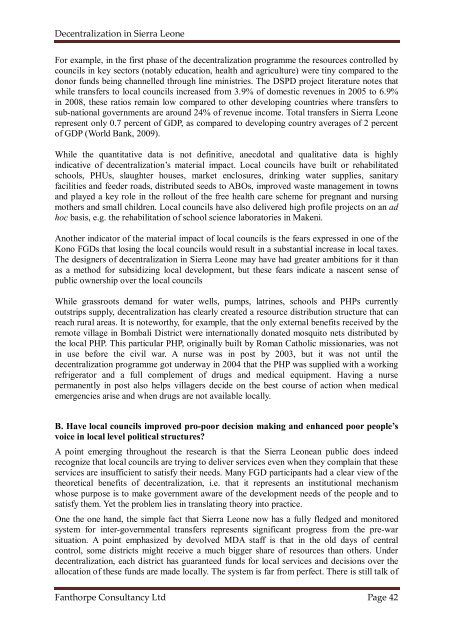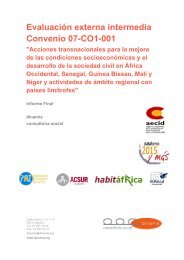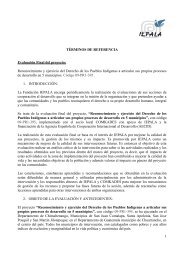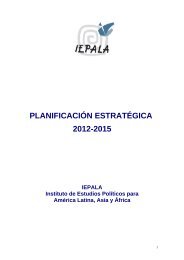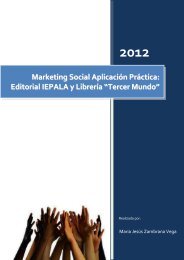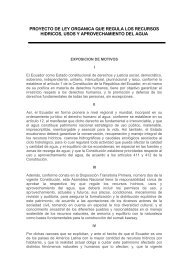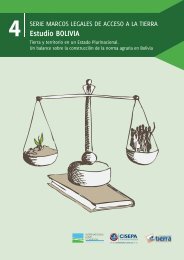Decentralization in Sierra Leone - Research for Development
Decentralization in Sierra Leone - Research for Development
Decentralization in Sierra Leone - Research for Development
Create successful ePaper yourself
Turn your PDF publications into a flip-book with our unique Google optimized e-Paper software.
<strong>Decentralization</strong> <strong>in</strong> <strong>Sierra</strong> <strong>Leone</strong>For example, <strong>in</strong> the first phase of the decentralization programme the resources controlled bycouncils <strong>in</strong> key sectors (notably education, health and agriculture) were t<strong>in</strong>y compared to thedonor funds be<strong>in</strong>g channelled through l<strong>in</strong>e m<strong>in</strong>istries. The DSPD project literature notes thatwhile transfers to local councils <strong>in</strong>creased from 3.9% of domestic revenues <strong>in</strong> 2005 to 6.9%<strong>in</strong> 2008, these ratios rema<strong>in</strong> low compared to other develop<strong>in</strong>g countries where transfers tosub-national governments are around 24% of revenue <strong>in</strong>come. Total transfers <strong>in</strong> <strong>Sierra</strong> <strong>Leone</strong>represent only 0.7 percent of GDP, as compared to develop<strong>in</strong>g country averages of 2 percentof GDP (World Bank, 2009).While the quantitative data is not def<strong>in</strong>itive, anecdotal and qualitative data is highly<strong>in</strong>dicative of decentralization’s material impact. Local councils have built or rehabilitatedschools, PHUs, slaughter houses, market enclosures, dr<strong>in</strong>k<strong>in</strong>g water supplies, sanitaryfacilities and feeder roads, distributed seeds to ABOs, improved waste management <strong>in</strong> townsand played a key role <strong>in</strong> the rollout of the free health care scheme <strong>for</strong> pregnant and nurs<strong>in</strong>gmothers and small children. Local councils have also delivered high profile projects on an adhoc basis, e.g. the rehabilitation of school science laboratories <strong>in</strong> Makeni.Another <strong>in</strong>dicator of the material impact of local councils is the fears expressed <strong>in</strong> one of theKono FGDs that los<strong>in</strong>g the local councils would result <strong>in</strong> a substantial <strong>in</strong>crease <strong>in</strong> local taxes.The designers of decentralization <strong>in</strong> <strong>Sierra</strong> <strong>Leone</strong> may have had greater ambitions <strong>for</strong> it thanas a method <strong>for</strong> subsidiz<strong>in</strong>g local development, but these fears <strong>in</strong>dicate a nascent sense ofpublic ownership over the local councilsWhile grassroots demand <strong>for</strong> water wells, pumps, latr<strong>in</strong>es, schools and PHPs currentlyoutstrips supply, decentralization has clearly created a resource distribution structure that canreach rural areas. It is noteworthy, <strong>for</strong> example, that the only external benefits received by theremote village <strong>in</strong> Bombali District were <strong>in</strong>ternationally donated mosquito nets distributed bythe local PHP. This particular PHP, orig<strong>in</strong>ally built by Roman Catholic missionaries, was not<strong>in</strong> use be<strong>for</strong>e the civil war. A nurse was <strong>in</strong> post by 2003, but it was not until thedecentralization programme got underway <strong>in</strong> 2004 that the PHP was supplied with a work<strong>in</strong>grefrigerator and a full complement of drugs and medical equipment. Hav<strong>in</strong>g a nursepermanently <strong>in</strong> post also helps villagers decide on the best course of action when medicalemergencies arise and when drugs are not available locally.B. Have local councils improved pro-poor decision mak<strong>in</strong>g and enhanced poor people’svoice <strong>in</strong> local level political structures?A po<strong>in</strong>t emerg<strong>in</strong>g throughout the research is that the <strong>Sierra</strong> <strong>Leone</strong>an public does <strong>in</strong>deedrecognize that local councils are try<strong>in</strong>g to deliver services even when they compla<strong>in</strong> that theseservices are <strong>in</strong>sufficient to satisfy their needs. Many FGD participants had a clear view of thetheoretical benefits of decentralization, i.e. that it represents an <strong>in</strong>stitutional mechanismwhose purpose is to make government aware of the development needs of the people and tosatisfy them. Yet the problem lies <strong>in</strong> translat<strong>in</strong>g theory <strong>in</strong>to practice.One the one hand, the simple fact that <strong>Sierra</strong> <strong>Leone</strong> now has a fully fledged and monitoredsystem <strong>for</strong> <strong>in</strong>ter-governmental transfers represents significant progress from the pre-warsituation. A po<strong>in</strong>t emphasized by devolved MDA staff is that <strong>in</strong> the old days of centralcontrol, some districts might receive a much bigger share of resources than others. Underdecentralization, each district has guaranteed funds <strong>for</strong> local services and decisions over theallocation of these funds are made locally. The system is far from perfect. There is still talk ofFanthorpe Consultancy Ltd Page 42


